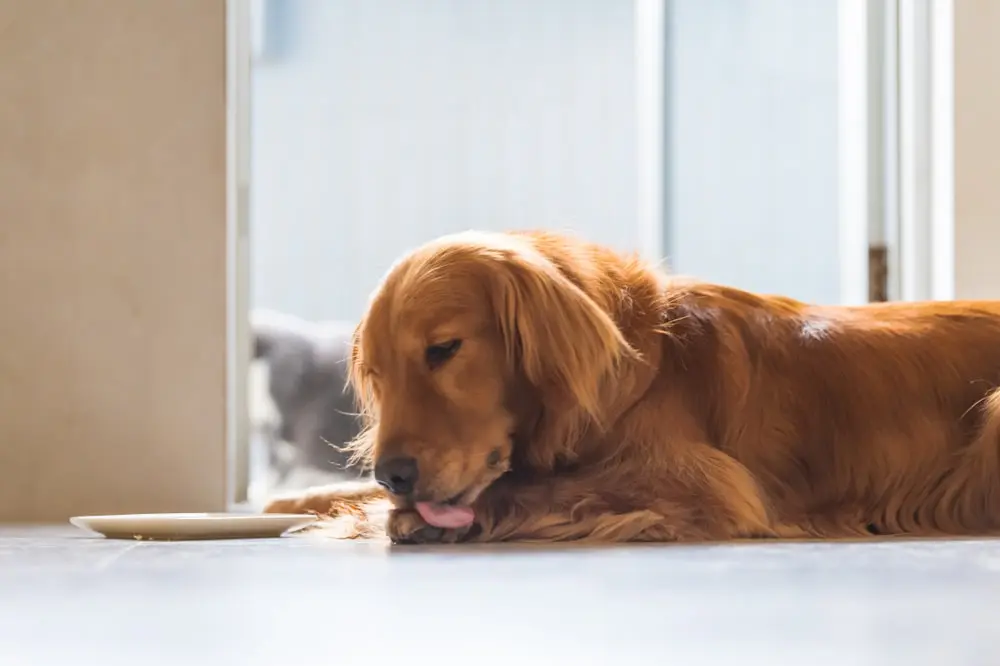PET HEALTH
Do you have a dog who licks their paws excessively?
Occasional dog paw licking is a natural part of the dog’s self-grooming routine. For example, if your pup licks sand or dirt off his paws when they return indoors, it shouldn’t be cause for concern. However, constant licking, biting, or swollen dog paws, could be a sign of a more serious issue.
When Is Dog Paw Licking an Issue?
You know your pet best, so you’ll likely be able to tell if their behavior is typical or if it needs further investigation.
Here are a few things to consider:
- Did this behavior appear suddenly?
- How long does the behavior continue?
- Does your dog only lick their paws during a specific time of year, or has it continued for an extended period?
- Is there a rash or redness in the area?
- Is there any bleeding, swelling, or odor in the area where your dog has been licking?
Why Dogs Lick Their Paws
Dogs can lick or chew their paws for several reasons. However, frequent, intense, and sometimes painful paw-licking is usually a sign of an underlying condition. Below are some of the most common reasons your dog may be licking their paws.
Injuries
If you notice your dog licking suddenly or focusing on one paw, examine the paws to determine if there is a cut, torn nail, or growth on the paw. You should also look between your dog’s paw pads where stones, thorns, splinters, and ice balls can become stuck.
Other possible causes for paw irritation include:
- Salted roads
- Hot pavement
- Bee stings
- Sharp objects
Food allergies
Your dog may be allergic to certain foods. Food allergies are known to cause itchy paws, ear infections, and skin irritations.
Because these allergies are difficult to diagnose, your vet may recommend a special diet or suggest you eliminate certain ingredients in your dog’s food.
Dermatitis
Many dogs who are frequent paw lickers suffer from canine atopic dermatitis, a common medical condition. Dogs with atopic dermatitis may inherit a predisposition to developing an allergic reaction after repeated exposure to an otherwise harmless substance.
The substance that causes the allergic reaction is known as the “allergen.” This is similar to a human allergic reaction to pet dander, pollen, shellfish, or gluten. The most common causes of canine allergic dermatitis are flea allergies, food allergies, inhalant allergies, or contact allergies. The cause could also be an allergy to the skin’s normal bacterial flora and yeast organisms.
Animals who suffer from dermatitis are likely to rub, lick, chew, bite, or scratch at their feet. They may also present with patchy or inconsistent hair loss, reddening of the area, or thickening of the skin.
Dry skin
Dry skin can be a common dog skin condition. Like dry skin and dandruff in humans, this condition causes a dog’s skin to be irritated, cracked, and flaky.
Common causes of dry skin in dogs include:
- Excessive bathing, which removes the skin’s natural oils
- Dry air
- Allergies
Parasites
Infections caused by parasites, such as fleas or mites that cause mange, can make your pup’s paws extremely itchy. A dog might lick or chew at the skin incessantly to stop the itching. If you suspect this is the cause, it is recommended to contact your veterinarian to discuss treatment for parasites.
Anxiety and compulsive disorders
Some dogs may have anxiety or canine compulsive disorder (CCD). This is the canine version of obsessive-compulsive disorder, an anxiety disorder in humans characterized by intrusive thoughts and repetitive behaviors.1
Common compulsive behaviors for dogs with CCD include paw licking, tail chasing, and tail licking.
How To Prevent Dogs From Licking Their Paws
When your dog is licking their paws excessively, they can cause dryness, swelling, and sores if left unchecked. It’s important to do what you can to prevent them from doing further damage.
Sometimes it can be helpful to give your pup a fun distraction like going for a walk, playtime, or giving them a chew toy. If you think your dog may be licking their paws out of anxiety, providing them some calming treats or toys can help them feel more relaxed. Additionally, rinsing their feet in lukewarm water and thoroughly drying them could help them feel a bit more comfortable.2
If you’re worried about your dog licking their paws too much, you may want to contact your veterinarian for further help and insight.
Dog Paw Licking: When to See Your Vet
Keep in mind that it is normal for a dog to lick its paws periodically. However, if you notice your furry friend is licking excessively, you may want to consider contacting your vet. Paw licking can become an addictive behavior that is difficult to extinguish.
Constant licking can also cause a buildup of moisture between your dog’s toes, creating the perfect breeding ground for bacteria and subsequent infection. Letting your vet examine your dog could help put your mind (and your pup’s paws) at ease, and potentially catch any issues before they turn into serious problems.
The Bottom Line
It’s normal for dogs to lick their paws occasionally, but too much paw licking can be a sign of something more serious. While it can be expensive to bring your pet to the vet every time they lick, it’s important to get them checked out to ensure there’s no underlying conditions.
With dog insurance, you can help offset the cost of your vet visit and help make sure your furry friend is feeling their best without breaking the bank.3 Get a free quote today.

